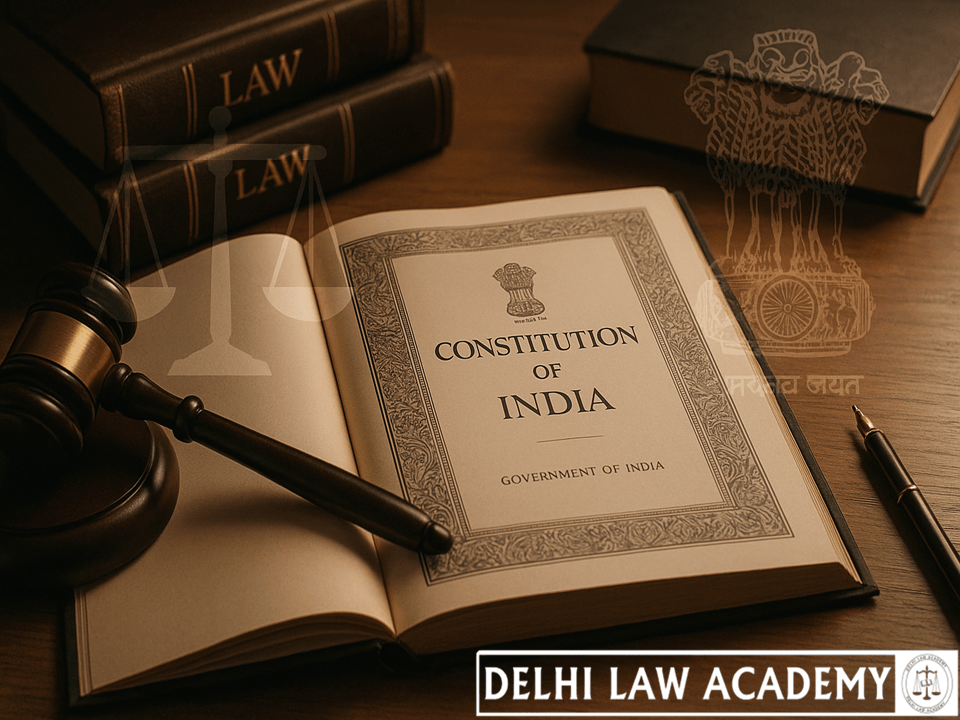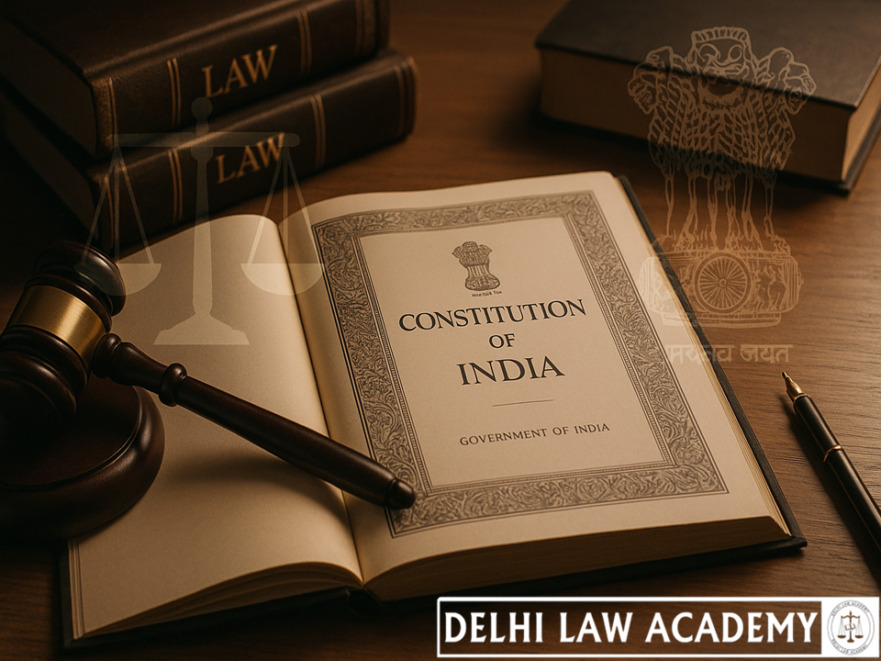
⭐ SPECIAL PROVISIONS FOR CERTAIN CLASSES (Articles 331–340) ⭐
Delhi Law Academy Jaipur presents below for aspirants of RJS, DJS, PCS (J) and other Judicial Services throughout India a simplified Note on special provisions for certain classes as contained in Part XVI of our Constitution.
📘 Constitutional Provisions
🔹 Article 330 — Reservation of seats in House of People
- Seats shall be reserved in House of People for Scheduled Castes and Scheduled Tribes
Reservation for SCs in a State:
Seats reserved for SCs /Seats allotted to State = Population of SCs in State /Total population of State
Reservation for STs in a State:
Seats reserved for STs /Seats allotted to State = Population of STs in State /Total population of State
“Population” here means population as determined by 2001 census
Population will remain frozen at this level till first census taken after 2026
🔹 Article 331 — Anglo-Indian community in House of People
- If in his opinion Anglo-Indian community is not adequately represented in House of People
- President may nominate upto 2 members of that community to the House
🔹 Article 332 — Reservation of seats in Legislative Assemblies
- Seats shall be reserved in Legislative Assembly of every State for Scheduled Castes and Scheduled Tribes
Reservation for SCs: Number of seats reserved/total seats in Assembly = population of SCs /total population of State
Reservation for STs: Number of seats reserved/total seats in Assembly = population of STs /total population of State
Seats shall also be reserved for autonomous districts in Legislative Assembly of Assam
🔹 Article 333 — Anglo-Indian community in Assemblies
- If in his opinion Anglo-Indian community needs representation in Assembly and is not adequately represented therein
- Governor may nominate one member of that community to Assembly
🔹 Article 334 — End of reservation
- Reservation of seats for SCs and STs in House of People and Legislative Assemblies shall cease to have effect on expiration of 80 years from commencement of Constitution
- [Note: The expiration period has been extended by the 104th Amendment 2019]
- Nomination of Anglo-Indian community shall cease to have effect on expiration of 70 years from commencement of Constitution
- [Note: This provision has ceased to have effect since 26th January 2020]
🔹 Article 335 — Efficiency of administration
- Claims of SCs and STs shall be considered consistently with maintenance of efficiency of administration in making of appointments to services under Union or State
Relaxation for promotions:
- This article does not prevent State from making any provision for SCs and STs for relaxation in qualifying marks or for lowering standards of evaluation for reservation in promotions
- [Note: Inserted by the 82nd Amendment 2000]
🟦 Article 338 — National Commission for Scheduled Castes
- There shall be a National Commission for Scheduled Castes
- It shall consist of Chairperson, Vice-Chairperson, three other members
- [Note: Substituted by the 65th Amendment 1990 for Special Officer for SCs and STs]
Functions:
- Investigate and monitor safeguards for SCs
- Inquire into complaints on deprivation of safeguards
- Recommend protection, welfare & socio-economic development
- Submit Annual Report to President (placed before Parliament)
- Union & State Governments must consult the Commission on major policy matters affecting SCs
Provisions apply also to Other Backward Classes and Anglo-Indian community
🟦 Article 338A — Commission for Scheduled Tribes
Inserted by the 89th Amendment 2003. Similar provisions as Article 338.
🟦 Article 338B — National Commission for Backward Classes
Inserted by the 102nd Amendment 2018
- Chairperson, Vice-Chairperson, and three Members appointed by the President
- Investigate and monitor safeguards for SEBCs
- Inquire into complaints of deprivation
- Advise on socio-economic development
- Present Annual Report to President
🟦 Article 340 — Commission for Backward Classes
- President may appoint a Commission to investigate conditions of socially & educationally backward classes
- Commission will recommend steps for improvement and grants
- Report shall be laid before Parliament with action-taken report
📘 Stay Ahead with Delhi Law Academy!
Get access to free monthly current affairs, read our insightful blogs,
and explore free study resources prepared by experts at DLA Jaipur. 🚀
FAQs on Special Provisions for Certain Classes 🏛️ (Arts. 331–340)
🗳️
Are Anglo-Indian nominations in the Lok Sabha/State Assemblies still allowed after 2020?
Lok Sabha: The President’s power to nominate up to two Anglo-Indian members has ceased—the provision ended after 70 years from the Constitution’s commencement and is no longer in force since 26 Jan 2020.
State Assemblies: Similarly, the Governor’s power to nominate one Anglo-Indian member has also ceased from the same date.
📅
Until when do SC/ST seat reservations in Lok Sabha & State Assemblies continue?
Reservations for Scheduled Castes and Scheduled Tribes in the House of the People and State Legislative Assemblies continue up to 80 years from the Constitution’s commencement (as extended). The blog notes the recent extension via the 104th Constitutional Amendment (2019).
Key point: The Anglo-Indian nomination provision ended, but SC/ST reservations continue per the extended timeline under Art. 334.
🧮
How are reserved seats for SC/ST calculated and which census is used?
- Lok Sabha (Art. 330): Seats reserved for SC/ST in a State are in the same proportion as the SC/ST population to the State’s total population.
- Census Base: “Population” is as per the 2001 Census and remains frozen until the first census after 2026.
- Rotation: Reserved seats may be allotted by rotation to different constituencies (as the State framework provides).
📈
What does “efficiency of administration” mean in reservations & promotions?
Art. 335 requires that the claims of SCs/STs be considered consistently with the maintenance of administrative efficiency in public appointments.
With the 82nd Amendment (2000), States may provide for:
- Relaxation in qualifying marks and/or
- Lowering standards of evaluation for reservation in promotions for SCs/STs, as policy permits.
🏛️
What are the powers & duties of the National Commissions under Articles 338, 338A & 338B?
- Composition: Chairperson, Vice-Chairperson & three Members (appointed by the President).
- Core functions: Investigate, monitor, inquire into safeguards for the concerned classes; recommend measures for protection, welfare & socio-economic development.
- Reporting: Present Annual Reports to the President; reports laid before Parliament with action-taken notes.
- Consultation: Union & States should consult these Commissions on major policy matters affecting the communities.
🧭
How is the NCBC (Art. 338B) different from a Backward Classes Commission under Article 340?
- NCBC (Art. 338B): A constitutional commission with a standing mandate to monitor safeguards, inquire into complaints, advise on SEBC development, and report annually to the President.
- Art. 340 Commission: A specific commission appointed by the President to investigate conditions & difficulties of backward classes and recommend steps & grants; it reports to the President for laying before Parliament.
Contact us
📍 Delhi Law Academy – Jaipur Branch
6C, Tower 2, Coaching Hub, Pratap Nagar, Jaipur – 302033
📞 Phone:
+91 9911916552
+91 8447285606
✉️ Email:
contactus@delhilawacademy.com

